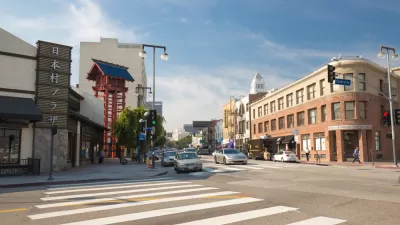The San Francisco Planning Commission took historic action earlier this month, voting to end the use of Level of Service in environmental review.
"The San Francisco Planning Commission voted 6-0 today to adopt a resolution to move forward with state-proposed guidelines that modernize the way city officials measure the transportation impacts of new development," according to a press release from the Planning Department of the City and County of San Francisco.
"The commission voted to remove automobile delay as a significant impact on the environment and replace it with a vehicle miles traveled threshold for all California Environmental Quality Act, or CEQA, environmental determinations. The resolution, put forward by San Francisco Planning, allows San Francisco to immediately implement changes to how it analyzes environmental impacts of development and transportation projects rather than wait for state adoption."
The press release includes more background on the differences between Level of Service (LOS) and Vehicle Miles Traveled (VMT). The press release also includes soundbites from San Francisco Planning Director John Rahaim discussing the benefits of VMT over LOS. Also noted is the ongoing drafting process for new CEQA regulations at the State Office of Planning and Research (OPR). Planetizen last reported on the CEQA reform process in January, when OPR released a draft of recommended changes to CEQA.
San Francisco joins Pasadena as California cities taking a leadership role on LOS while the state undertakes its process.
FULL STORY: San Francisco Planning Takes Lead in Modernizing Environmental Review for New Development Projects

Alabama: Trump Terminates Settlements for Black Communities Harmed By Raw Sewage
Trump deemed the landmark civil rights agreement “illegal DEI and environmental justice policy.”

Planetizen Federal Action Tracker
A weekly monitor of how Trump’s orders and actions are impacting planners and planning in America.

The 120 Year Old Tiny Home Villages That Sheltered San Francisco’s Earthquake Refugees
More than a century ago, San Francisco mobilized to house thousands of residents displaced by the 1906 earthquake. Could their strategy offer a model for the present?

In Both Crashes and Crime, Public Transportation is Far Safer than Driving
Contrary to popular assumptions, public transportation has far lower crash and crime rates than automobile travel. For safer communities, improve and encourage transit travel.

Report: Zoning Reforms Should Complement Nashville’s Ambitious Transit Plan
Without reform, restrictive zoning codes will limit the impact of the city’s planned transit expansion and could exclude some of the residents who depend on transit the most.

Judge Orders Release of Frozen IRA, IIJA Funding
The decision is a victory for environmental groups who charged that freezing funds for critical infrastructure and disaster response programs caused “real and irreparable harm” to communities.
Urban Design for Planners 1: Software Tools
This six-course series explores essential urban design concepts using open source software and equips planners with the tools they need to participate fully in the urban design process.
Planning for Universal Design
Learn the tools for implementing Universal Design in planning regulations.
Clanton & Associates, Inc.
Jessamine County Fiscal Court
Institute for Housing and Urban Development Studies (IHS)
City of Grandview
Harvard GSD Executive Education
Toledo-Lucas County Plan Commissions
Salt Lake City
NYU Wagner Graduate School of Public Service




























